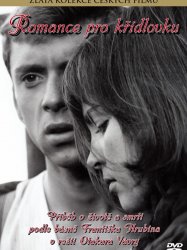Otakar Vávra is a Director, Scriptwriter and Producer Tchèque born on 28 february 1911 at Hradec Králové (Republique tcheque)

Otakar Vávra (28 February 1911 – 15 September 2011) was a Czech film director, screenwriter and pedagogue. He was born in Hradec Králové, Austria-Hungary, now part of the Czech Republic.
His first feature film was 1938's Cech panen Kutnohorských, starring Zorka Janů, sister of legendary Czech actress Lída Baarová. Janů also played in Vávra's films Podvod s Rubensem and Pacientka Dr. Hegela, both from 1940. Baarová starred in Vávra's films Panenství (1937), Maskovaná milenka (1939), Dívka v modrém (1939), and Turbína (1941).
After the Communists came to power in 1948, Vávra adapted quickly to the new political climate and produced films praising the current regime and supporting the new, official interpretation of the past.
In the 1950s he produced the "Hussite Trilogy", one of his most famous works, consisting of Jan Hus (1954), Jan Žižka (1955) and Proti všem (Against All Odds, 1957).
When the government became more liberal in the 1960s, Vávra's cinema entered into his most prolific period, producing Zlatá reneta (1965), Romance pro křídlovku (1966), Kladivo na čarodějnice (1969), and later Komediant (1984). His 1967 film Romance for Bugle was entered into the 5th Moscow International Film Festival where it won the Special Silver Prize. His 1973 film Days of Betrayal was entered into the 8th Moscow International Film Festival where it won a Diploma. In 1979 he was a member of the jury at the 11th Moscow International Film Festival.
When the Communists fell from power in 1989, state subsidies for the film industry were dropped and Vávra's plans for an historical epic titled Evropa tančila valčík had to be scaled down.
In the 1950s, Otakar Vávra, together with a group of fellow Czech film directors, established the Film Faculty of the Academy of Performing Arts in Prague (Filmová Akademia muzických umění or FAMU), where he taught for over five decades. Among his students were several directors of the 1960s "Czech New Wave" of art films, including future Oscar-winner Miloš Forman (One Flew Over the Cuckoo's Nest, Amadeus).
Source : Wikidata
Otakar Vávra

Nationality Republique tcheque
Birth 28 february 1911 at Hradec Králové (Republique tcheque)
Death 15 september 2011 (at 100 years) at Prague (Republique tcheque)
Awards National Artist
Birth 28 february 1911 at Hradec Králové (Republique tcheque)
Death 15 september 2011 (at 100 years) at Prague (Republique tcheque)
Awards National Artist
Biography
Vávra attended universities in Brno and Prague, where he studied architecture. During 1929–30, while still a student, he participated in the making of a handful of documentaries and wrote movie scripts. In 1931, he produced the experimental film Světlo proniká tmou. The first movie he directed was 1937's Filosofská historie.His first feature film was 1938's Cech panen Kutnohorských, starring Zorka Janů, sister of legendary Czech actress Lída Baarová. Janů also played in Vávra's films Podvod s Rubensem and Pacientka Dr. Hegela, both from 1940. Baarová starred in Vávra's films Panenství (1937), Maskovaná milenka (1939), Dívka v modrém (1939), and Turbína (1941).
After the Communists came to power in 1948, Vávra adapted quickly to the new political climate and produced films praising the current regime and supporting the new, official interpretation of the past.
In the 1950s he produced the "Hussite Trilogy", one of his most famous works, consisting of Jan Hus (1954), Jan Žižka (1955) and Proti všem (Against All Odds, 1957).
When the government became more liberal in the 1960s, Vávra's cinema entered into his most prolific period, producing Zlatá reneta (1965), Romance pro křídlovku (1966), Kladivo na čarodějnice (1969), and later Komediant (1984). His 1967 film Romance for Bugle was entered into the 5th Moscow International Film Festival where it won the Special Silver Prize. His 1973 film Days of Betrayal was entered into the 8th Moscow International Film Festival where it won a Diploma. In 1979 he was a member of the jury at the 11th Moscow International Film Festival.
When the Communists fell from power in 1989, state subsidies for the film industry were dropped and Vávra's plans for an historical epic titled Evropa tančila valčík had to be scaled down.
In the 1950s, Otakar Vávra, together with a group of fellow Czech film directors, established the Film Faculty of the Academy of Performing Arts in Prague (Filmová Akademia muzických umění or FAMU), where he taught for over five decades. Among his students were several directors of the 1960s "Czech New Wave" of art films, including future Oscar-winner Miloš Forman (One Flew Over the Cuckoo's Nest, Amadeus).
Usually with
Filmography of Otakar Vávra (27 films)
Director
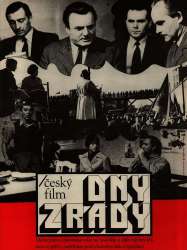
Days of Betrayal (1973)
, 3h47Directed by Otakar Vávra
Genres Drama, War, Historical
Actors Jiří Pleskot, Čestmír Řanda, Gustav Nezval, Vladislav Strzelczyk, Ota Sklenčka, Svatopluk Beneš
Rating53%





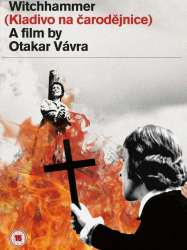
Witchhammer (1970)
, 1h43Directed by Otakar Vávra
Origin Tchecoslovaquie
Genres Drama, Thriller
Themes Films about magic and magicians, Witches in film
Actors Josef Kemr, Jiřina Štěpničková, Jiří Holly, Václav Lohniský, Čestmír Řanda, Blanka Waleská
Rating76%





Dans les années 1670 en Moravie, un enfant de chœur remarque qu'une femme âgée dissimule le pain donné pendant la communion et en informe le prêtre, qui questionne la vieille femme. Elle admet qu'elle a pris le pain pour le donner à une vache afin de réactiver sa production de lait. Le prêtre rapporte l'incident au seigneur local qui, à son tour, en appelle à un inquisiteur spécialisé dans les procès de sorcellerie, Boblig von Edelstadt .
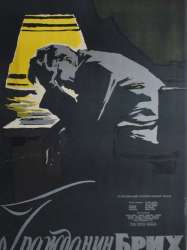
Občan Brych (1959)
Directed by Otakar Vávra
Genres Drama
Actors Karel Höger, Otomar Krejča, Zdeněk Štěpánek, Jaroslav Průcha, Miloš Kopecký, Eduard Kohout
Rating57%






Against All (1957)
, 1h49Directed by Otakar Vávra
Genres Drama, War, Historical
Actors Zdeněk Štěpánek, Gustav Hilmar, Václav Voska, Jaroslav Vojta, Eduard Kohout, Blanka Waleská
Rating66%






Jan Žižka (1956)
, 1h42Directed by Otakar Vávra
Genres Drama, War, Historical
Actors Gustav Hilmar, Karel Höger, Václav Voska, Vladimír Ráž, Miloš Kopecký, Zdeněk Štěpánek
Rating67%






Jan Hus (1955)
, 2h5Directed by Otakar Vávra
Origin Tchecoslovaquie
Genres Drama, Historical
Actors Zdeněk Štěpánek, Karel Höger, Ladislav Pešek, Gustav Hilmar, Josef Kemr, Rudolf Hrušínský
Rating68%





Le film retrace la vie du héros national Tchèque Jan Hus

Nástup (1953)
, 1h58Directed by Otakar Vávra
Genres Drama
Actors Ladislav Chudík, Karel Höger, Jaroslav Průcha, Andrej Bagar, Vlasta Fabianová, František Smolík
Rating45%






Silent Barricade (1949)
, 1h53Directed by Otakar Vávra
Genres Drama, War
Actors Jaroslav Průcha, Jaroslav Marvan, Jaromír Spal
Rating67%






Krakatit (1948)
, 1h50Directed by Otakar Vávra
Genres Drama, Science fiction, Thriller, Horror
Actors Karel Höger, Eduard Linkers, František Smolík, Florence Marly, Vlasta Fabianová, Jaroslav Průcha
Rating72%





A barely conscious, unidentified man is given intensive care by a doctor and a nurse. The man's hands are badly burned and cut. The doctor tells the nurse to give the man oxygen.
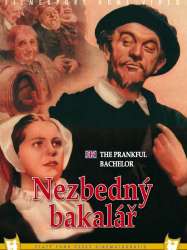
The Adventurous Bachelor (1946)
, 1h36Directed by Otakar Vávra
Genres Comedy, Historical
Actors Zdeněk Štěpánek, Otomar Korbelář, František Smolík, Jaroslav Marvan, Saša Rašilov, Jaroslav Vojta
Rating67%






Rozina the Love Child (1945)
Directed by Otakar Vávra
Genres Drama, Historical
Actors Zdeněk Štěpánek, Ladislav Boháč, Gustav Hilmar, Saša Rašilov, Zdeňka Baldová, František Filipovský
Rating63%






Enchanted (1942)
, 1h34Directed by Otakar Vávra
Genres Drama
Actors Nataša Gollová, Václav Vydra, Adina Mandlová, Karel Höger, Gustav Hilmar, František Filipovský
Rating58%





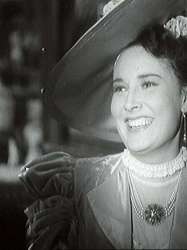
Turbina (1941)
, 1h36Directed by Otakar Vávra
Genres Drama, Historical
Actors František Smolík, Lída Baarová, Rudolf Hrušínský, Eduard Kohout, Jaroslav Vojta, Karel Höger
Rating65%






The Girl in Blue (1940)
, 1h27Directed by Otakar Vávra
Genres Comedy, Fantasy
Actors Lída Baarová, Oldřich Nový, Růžena Šlemrová, Sylva Langova, Antonie Nedošinská, Nataša Gollová
Rating71%





 Connection
Connection

